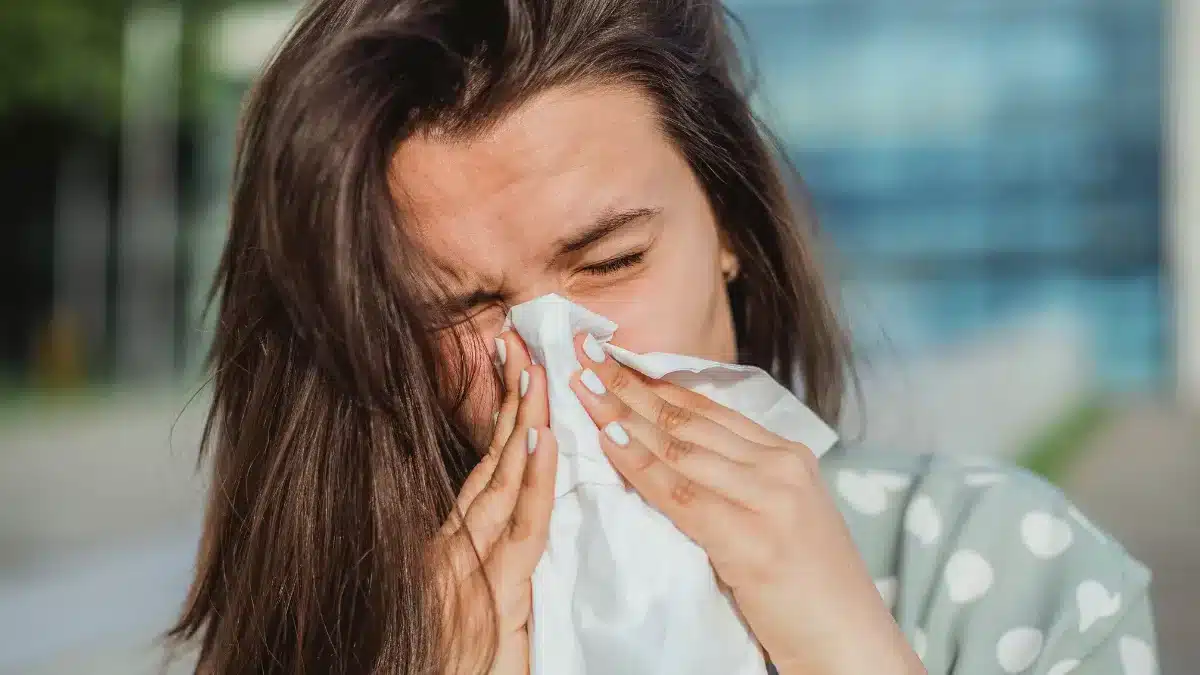Watery eyes and runny nose are common symptoms that can be triggered by factors like allergies and infections.
It can be very hard to deal with watery eyes and runny nose if you don’t know the cause.
Therefore, understanding the cause is very important for treating the condition effectively.
In this article, we will look at the causes of watery eyes and runny noses and how to treat them.
Why are my eyes watery and my nose runny
Before understanding the causes, knowing how a runny nose and watery eyes are connected is important.
Rhinorrhea is the medical term used when mucus continuously comes out of your nasal tubes.
A runny nose is usually followed by red eyes and watery eyes that itch. These symptoms are often the body’s natural defense against foreign objects.
Watery eyes and a runny nose might be ways for the body to eliminate allergens or foreign particles in the lungs.
Because of this, both of these symptoms usually show up simultaneously and sometimes go away on their own.
What causes watery eyes and runny nose
There are several causes of watery eyes and a runny nose, which can irritate a person.
These symptoms may appear together in an individual due to allergies and infections.
These allergies might occur due to dust, pollen, or other foreign particles. At the same time, the infections may include Sinusitis or viral infections like colds or flu.
Let us take a closer look at all these factors below
Allergies
Most of the time, allergies are blamed for watery eyes and runny nose. A study discovered that allergic rhinitis, or a runny nose, might cause sneezing and nasal congestion.
Myelin, dust, pollen, and pet dander are all allergens that can cause the body to release histamines as a defense.
These histamines can cause blood vessels to widen and make more mucus, making your eyes and nose watery.
Getting tested for specific allergens and taking precautions like using air filters can help you deal with these symptoms better.
Infections
 Source: Siganture_image
Source: Siganture_imageColds and flu, caused by bacterias or viruses, can also make your eyes watery and your nose run.
Infections make the immune system work harder, which causes swelling, thus enhancing the tears and mucus production.
Good cleanliness, like washing your hands and staying away from people who are sick, can lower the risk of infection.
Runny nose and watery eyes treatment
The best way to treat watery eyes and a running nose depends on what’s causing them and how bad the symptoms are.
Doctors often prescribe antihistamines when allergies are responsible for watery eyes and runny nose.
These medicines work well to treat allergies and make symptoms like watery eyes and a runny nose less severe.
Doctors may also give you decongestants and nasal corticosteroids to help with inflammation, a major cause of runny eyes.
Antibiotics can help people with these symptoms because of bacterial infection.
Taking cold and antiviral medicines can be a good way to treat viral diseases like flu.
Want to know more about eye drops for watery eyes? Read our article: Eye Drops for Watery Eyes
Conclusion
Understanding the causes of watery eyes and a runny nose is important for effective treatment.
These symptoms often result from allergies, triggered by substances like dust and pollen or infections such as colds and flu.
Histamines and more mucus production are part of the body’s defense system, causing runny nose and watery eyes.
For personalized treatment, it is important to consult a doctor.
They can prescribe you medicines like antihistamines, decongestants, and antibiotics, depending on the cause.
Also, maintaining good hygiene and preventive measures can significantly reduce the risk of infections.
Frequently Asked Questions
Why are your eyes watering and your nose running?
Various factors contribute to these symptoms, including allergies (e.g., dust, pollen) and infections (such as colds or flu). Understanding the underlying cause is crucial for effective treatment.
Are watery eyes and a runny nose interconnected?
Yes, they often happen at the same time. This happens because of the body’s natural defense system. Histamines are released, making blood vessels wider, and more mucus is produced to eliminate allergens or foreign particles.
How do I stop my runny nose and watery eyes?
The treatment depends on what caused your runny nose and watery eyes. People with allergies are often given antihistamines, decongestants, and nasal corticosteroids. People with bacterial illnesses may be given antibiotics. Getting medical help makes sure that your symptoms are managed in a way that works best for you.
What is the role of infections in causing these symptoms?
When you have a viral or bacterial infection, like the flu or a cold, your immune system has to work harder, which makes your body produce more mucus and swelling. Keeping yourself clean can lower your chance of getting infections.
How can allergies contribute to watery eyes and a runny nose?
Allergens like pollen and pet dander result in the release of histamines as a defense mechanism by our immune system. Histamines cause blood vessels to widen and enhance mucus production, resulting in symptoms like watery eyes and a runny nose.
When referencing outside resources, GoodrxMedicine always provides full citations. To learn more about the measures we use to maintain the quality of our content, please review our Content Information Policy.











